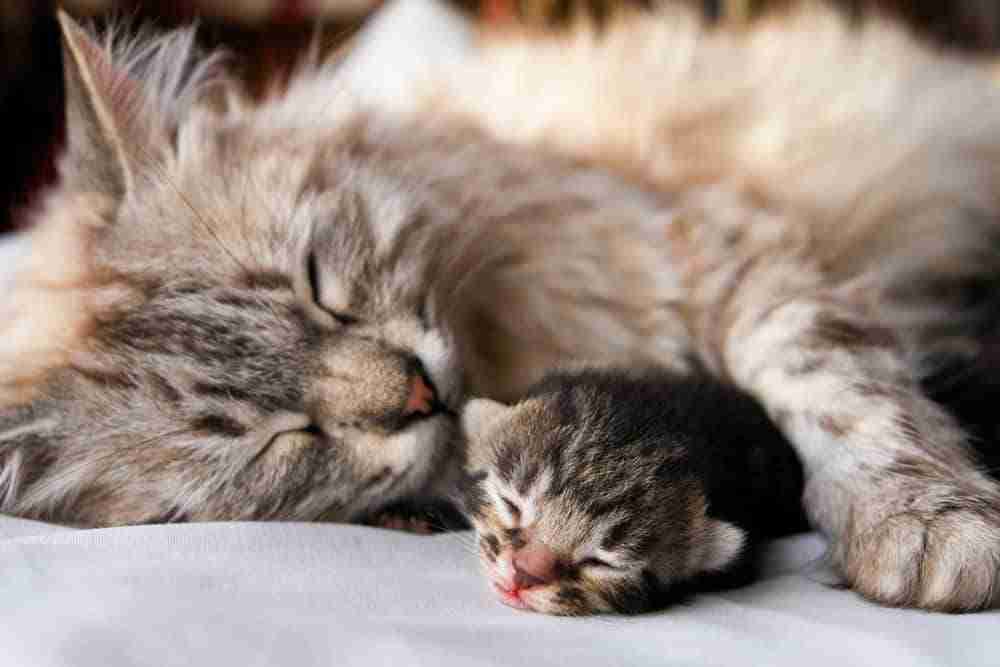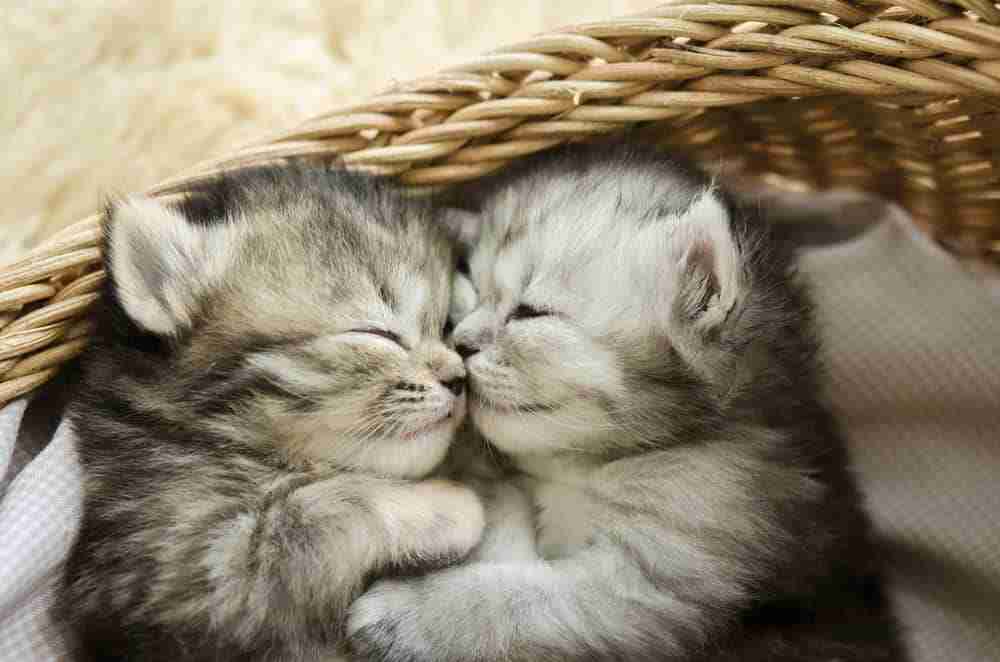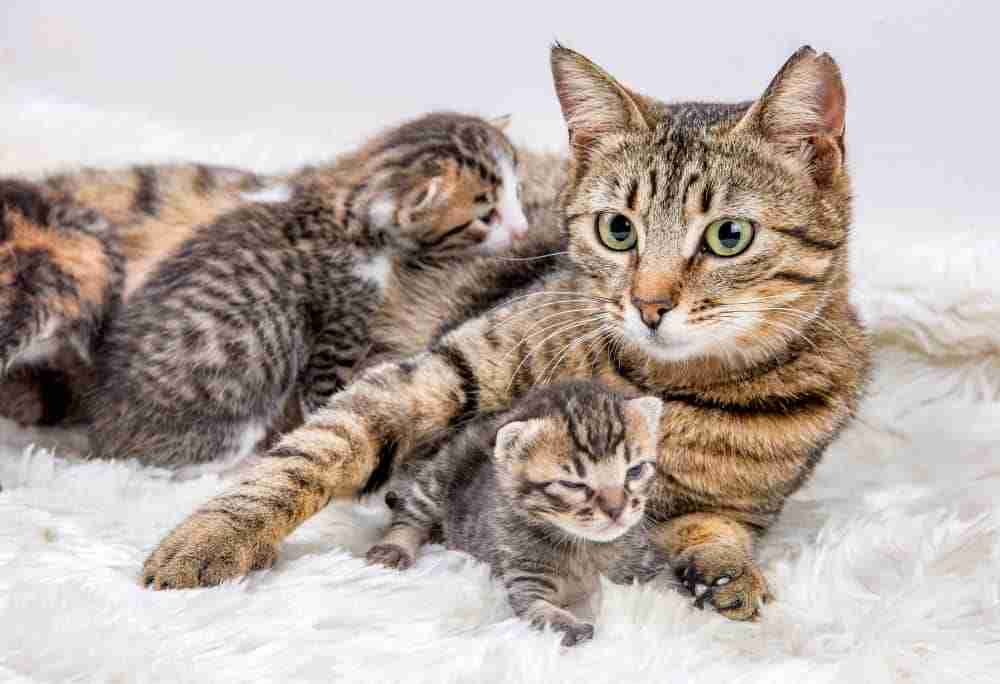What does a mother cat do with a dead kitten? This may seem to be a strange question, but if you have a pregnant cat the thought might have crossed your mind. It is not unheard of for kittens to fade or be stillborn. What might happen in these scenarios? Is your cat going to mourn the loss of a kitten? Is their behavior going to change? Are they going to do something strange and unexpected? We have given this some thought and researched what goes on in the situations. Read on to learn about the macabre, weird, instinctive, and otherwise normal things you might expect to see if your cat gives birth and a kitten dies or is stillborn.
Buries Or Hides It
A mother cat who experiences the loss of a kitten through kitten fading or stillbirth will often bury or hide the dead kitten’s body. This is thought to be an instinctive act. There are several good reasons for the mother cat to act in this way.
Burying the body is an effective way to reduce the risk of infection and disease spreading to the other kittens in the litter from living within close proximity to the decomposing litter mates body.
It can also be a good way to reduce the odor of decomposition. In the wild, reducing odor is important as scavenging predators in the area may be attracted to the litter by the smell of decomposition, putting the whole litter at risk.
Burying the remains also means the mother cat and kittens do not necessarily have to vacate a prey rich territory for fear that odor may identify their position and highlight the richness of the territory.
Hiding the remains without burying also occurs in the wild from time to time. Although not as effective as burying from the point of odor control, it can help safeguard the surviving kittens by making their location less identifiable.
A domestic cat, particularly one kept indoors who can’t bury a dead kitten, is quite likely to hide a dead kitten’s body – it is just a mother’s instinct to protect the remaining kittens from scavengers where possible.

Eats It
Slightly macabre, but mother cats are known to eat dead kittens – hell, they are even known to eat kittens that are deformed or otherwise weak if they are suspected of not being long term viable, but are still alive! In these instances, they will deliver a mercy killing and eat the remains!
So what is going on here? Well, as in the case of burying or hiding, by eating the remains they are looking to reduce the chances of infection in the other kittens and instinctively reduce the odds of identification and exposure to predators in the area.
It sounds terrible when you apply human values to the act….but nature is complex and there are some additional benefits to the act.
Raising kittens is a large undertaking that can put a lot of additional stress on the mother’s body. Eating a dead or unviable kitten can recycle essential nutrients that can be put to good use raising the remaining kittens.
Domestic cats eating stillborn kittens and occasionally a runt of the litter cat is not unheard of. If you have a cat with a litter and a kitten, particularly a smaller kitten, goes missing the chances are quite high that the mother has eaten the kitten.
Gives It To Cat Guardian
A mother cat won’t always bury, hide, or eat a dead kitten. Often a domestic cat will simply present the body of the dead kitten to its cat guardian.
It is almost like they instinctively know that the body has to go and they trust the guardian to act in the appropriate manner to dispose of the body safely.

Abandons the Body
Especially in the wild but also in some domestic circumstances the mother cat will simply move herself and her litter away from the dead body – essentially abandoning the body.
The thinking is clear – the body represents a risk to the litter by attracting predators or increasing the risk of disease. Putting distance between the body and the surviving litter members improves the odds of survival.
It also avoids the effort of burying when resources need to be rationed for the survival of the litter or ground conditions might make burial impossible.
Although you are more likely to see this behavior in the wild or with stray cats you might also find your domestic mother cat moves her kittens if one of the litter members dies.
What Other Behaviors Might A Mother Cat Display With A Dead Kitten?
In many ways cats are likely people – they have highly varied personalities. Some cats may not respond negatively to a dead kitten, they may be very matter of fact, but others may be deeply affected by the experience and demonstrate all sorts of behaviors.
Some cats that lose a kitten are very protective of the dead kitten’s body and will not be willing to accept the death or allow the body to be removed. These cats may lick and groom the body and in some cases even lay on the body to prevent removal of the body.
Sometimes, if the body is not properly disposed of, simply put aside for disposal at a future point the mother or even father cat will retrieve the body in the mistaken belief that the kitten needs to be brought back into the litter – heartbreaking to witness, but does happen on rare occasions.
Some Other Frequently Asked Questions Surrounding Kitten Deaths
Do Cats Mourn The Death Of Their Kittens?
As we touched on, some cats do not take the death of a kitten well and some cats do mourn. Research has found that the stronger the bond the cat has with the two or four-legged friend who has passed the more likely the cat is to exhibit mourning behavior. These mourning behaviors often include loss of appetite, sleeping longer, becoming clingy, etc.
In the case of kittens, the bonds become stronger day by day. A kitten that fades away within a few days or a stillborn kitten may not result in a mourning mother quite so much as a kitten that has made it through several weeks and with whom the mother has a stronger bond.
Death of a kitten may result in the mother exhibiting searching behavior or calling behavior more than usual.
Why Did My Cat Bring Me Her Dead Kitten?
They probably want you to suitably dispose of the body. Some people believe that the cat is choosing you for the task as a sign of trust and respect. Whilst there may be some truth in this, your cat probably is acting instinctively to maintain the health of her other kittens and has no other means of disposing of the body – you are johnny on the spot as the most efficient route to removing the danger a decomposing body might bring to her other kittens.
Should I Remove A Dead Kitten From The Litter?
Yes, you should remove a dead kitten from a litter.
A dead kitten will decompose and potentially cause infection in the other kittens or the mother cat.
A dead kitten is a health hazard. Your cat may not want you to take the kitten – they may growl and become protective – the best bet in these circumstances is to lure the mother cat away with a meal and then remove the dead kitten whilst they are eating – in all likelihood, the mother probably won’t notice the dead kitten is missing on her return to the litter.
